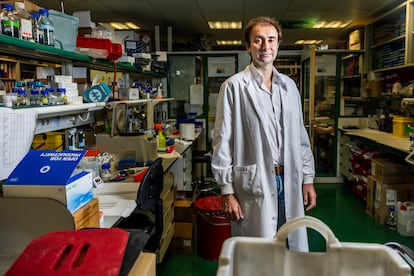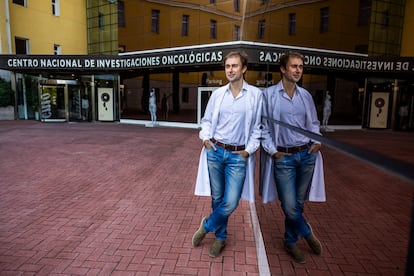Miguel Quintela, oncologist: ‘Sometimes we spoil the efficacy of a treatment against cancer with a bad diet’
The doctor, a scientist at Spain’s National Oncological Research Center, has just launched a spin-off on personalized oncology nutrition to help optimize the results of therapies and reduce toxicities

Diet can play a crucial role in an oncological process. First, in the prevention of the disease, as a diet rich in vegetables and free of ultra-processed foods and red meats, for instance, is healthier and averts the threat of cancer risk factors, such as obesity or diabetes. However, the role of nutrition in patients with a diagnosed tumor is also becoming increasingly significant. Adequate nutrition alone will not cure the disease, but it can help to optimize treatments and avoid toxicities, according to Miguel Quintela, director of the Clinical Research Program at Spain’s National Oncological Research Center (CNIO).
The doctor (A Coruña, 47 years old) is an oncologist at the Hospital 12 de Octubre in Madrid and divides his time between the consulting room and the laboratory. He defends the importance of a healthy diet as one more weapon in the arsenal of cancer therapy. Indeed, he has just launched a spin-off of personalized oncological nutrition, TNCterapia, to provide customized diets to meet the needs of patients. The company has gathered all the available scientific evidence and, by means of an algorithm that individually analyzes the patient’s condition, type of tumor, stage and treatment received, among other variables, it creates nutritional guidelines that its nutritionists convert into a 15-day menu consisting of two courses and dessert. “We remove essential nutrients for the tumor, we give nutrients that are toxic for the tumor and we modify the microbiome [the ecosystem of microbes that inhabit the organism] to positively regulate the immune system. With the therapy, we contribute to the tumor treatment, by improving efficacy and decreasing toxicities,” he explains.
The scientific evidence on the potential of nutrition to intervene in the oncological process is increasingly compelling, according to the scientist, although there is still much room for maneuver when it comes to applying all the findings suggested by the scientific studies to clinical practice.
Question. How does what we eat influence an oncological process?
Answer. The environment of the western world increases our propensity to develop cancer. In terms of nutrition, it appears that the incidence of all typical cancers doubles in this cancer-prone environment in industrialized countries. Partly because of obesity, but also because they destroy the microbiome, because they have a higher hormonal load, because they are more inflammatory. The impact on treatment is less quantified because the evolution of the tumor and the pharmacological aspect is something that carries so much weight, that the magnitude will be seen when, instead of randomizing one drug against another, we randomize patients with an open diet or a targeted diet according to these types of factors that I have mentioned. All this is quite quantified in animal models and seems to double the efficacy and in some studies that are being conducted with diets like fasting, they are yielding very high survival rates.
Q. Which foods are less damaging to an oncological process?
A. In general, we should try to adhere to a vegetarian diet as much as possible. This does not mean that we suppress the intake of proteins because there are plant foods that are very rich in protein, such as nuts and legumes. It is also very important to eat fiber and fermented foods. Without animal diets, we are bypassing a number of hormone disruptors and immune system activity disruptors that alter the overall response against the tumor, as well as a number of chemical compounds that are produced during digestion and disorient the immune system. By avoiding processed foods, we are going to be avoiding the administration of fructose [a type of sugar], which, shall we say, is feeding the tumor. And with fiber and fermented foods, because they produce specific changes in the microbiome that are extremely positive for enhancing the type of immune response that we want.
Q. What is the objective that can be achieved by regulating diet?
A. It is evident that the fasting-like diet greatly reduces the toxicity of the treatment and that is essential and must be implemented, but there are other things that can be done. There are fewer published data, but in cases of melanoma with restoration of the microbiome, some patients have been found to respond well and time will tell if they are cured or not. Unlike some new drugs, which are now known to be toxic in Phase I trials, here we assume that we are not going to do any harm. Some aspects have been quantified, but all of them together, when, until when and for whom, are questions that we want to resolve with specific clinical trials. Increasingly, we will have more and more answers.
By avoiding processed foods, we are going to be avoiding the administration of fructose [a type of sugar], which, shall we say, is feeding the tumor”
Q. What is the hypothesis and how much potential does it have?
A. The main objective is to improve efficacy and reduce toxicity. And perhaps, in terms of improving efficacy, it may be a matter of optimizing, of reaching the maximum efficacy that this therapy can deliver because sometimes we spoil the efficacy of a treatment [against cancer] with a bad diet. A poor diet can alter the efficacy, either by interfering with the absorption of the drug in its metabolism, through the administration of toxic nutrients and also because, if we have a lot of toxicity, we end up reducing the dose the patient receives or interrupting it. So, if we optimize the drug intake, decrease toxicity and intervene in its activity with the optimal diet, we can achieve the maximum that this therapy can yield.
Q. What are the limitations?
A. There are things that are impossible, things that have been demonstrated in animals that are barbaric, but which could not be possible in patients. For instance, there are studies that show that a diet without serine and methionine [two types of amino acids] is extremely therapeutic. There is a study in which mice were deprived of serine and methionine and the tumors disappeared, but the animal died because methionine is an essential amino acid and serine is semi-essential. There is a quantity below which is not compatible with survival.
Q. Can a diet help to change the prognosis of the disease?
A. The evidence suggests that it does, and we want to extend it. Some maneuvers, whether by decreasing toxicity or increasing efficacy, seem to improve the evolution of the disease.

Q. You say the strategy is to remove essential nutrients for the tumor and give it other toxic ones. How do tumor cells behave?
A. If you give the body fructose, it is its addictive nutrient: the tumor can use it faster and more efficiently than normal cells, which do not need it at all. Excess serine is another food for the tumor: serine, which is found in red meat or liver, is tremendously useful for the tumor to generate other molecular structures.
Q. And what is toxic to a tumor cell? What is its poison or its weakness?
A. For instance, in terms of sugars, there is a sugar called mannose, which usually metabolizes in normal cells, but in some tumors with some particular mutations, it stops and blocks glycolysis [chemical reactions that breakdown sugars to obtain energy]. But here we have to start to narrow it down and we have to see if the patient is diabetic or not and we can give them a source of mannose, or we have to see if they are undergoing immunotherapy, because mannose can affect the immune system. This is why we call it precise therapeutic nutrition. Each patient is a specific case.
A poor diet can alter the efficacy, either by interfering with the absorption of the drug in its metabolism, through the administration of toxic nutrients”
Q. Fasting-like diets are controversial in the scientific community because of the limitations of the available evidence, which is more substantial in animal models. What happens on the molecular level when there is a restriction of intake?
A. A normal cell has two states: the proliferative, growth state; and the protective and repair state. This is regulated by many things, but one of them is the availability of nutrients. When energy-generating nutrients fall below normal levels, a normal cell enters a state of repose and repair, it does not multiply or grow, and begins a process of autophagy that allows damaged structures to regenerate and DNA to be repaired, for instance. What does it do in the tumor cell? It is insensitive to this process and, in spite of the disappearance of nutrients, it keeps on multiplying. And because of this addiction to replication, even in the absence of nutrients, after a specific period of time, this can kill the tumor cell. So, many of the therapeutic agents that we utilize in oncology are directed against the replication process itself and if you take one of these agents, it’s going to damage your tumor cells and your healthy cells. But since we have induced this state of cellular quiescence with nutrient restriction, the healthy cells will be immune to the treatment you are administering. So, on the one hand, you have increased the efficacy and, on the other, you have protected the good cells from toxicity.
Q. After reading this interview, some patients might think that if they eliminate sugar from their diet, if they stick to some kind of diet on their own or start intermittent fasting, for example, they might improve their cancer process. What would you tell them?
A. The recommendation is that no one should do anything on their own. Just as you should not self-prescribe cancer treatment.
Sign up for our weekly newsletter to get more English-language news coverage from EL PAÍS USA Edition
Tu suscripción se está usando en otro dispositivo
¿Quieres añadir otro usuario a tu suscripción?
Si continúas leyendo en este dispositivo, no se podrá leer en el otro.
FlechaTu suscripción se está usando en otro dispositivo y solo puedes acceder a EL PAÍS desde un dispositivo a la vez.
Si quieres compartir tu cuenta, cambia tu suscripción a la modalidad Premium, así podrás añadir otro usuario. Cada uno accederá con su propia cuenta de email, lo que os permitirá personalizar vuestra experiencia en EL PAÍS.
¿Tienes una suscripción de empresa? Accede aquí para contratar más cuentas.
En el caso de no saber quién está usando tu cuenta, te recomendamos cambiar tu contraseña aquí.
Si decides continuar compartiendo tu cuenta, este mensaje se mostrará en tu dispositivo y en el de la otra persona que está usando tu cuenta de forma indefinida, afectando a tu experiencia de lectura. Puedes consultar aquí los términos y condiciones de la suscripción digital.









































